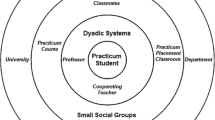Abstract
This article looks at the connection between upgrading the professional status of early childhood teachers and parent involvement in early childhood programs. It clarifies terms and ponders how each concept affects the other.
Résumé
Cet article porte sur le rapport entre le rehaussement du statut professionnel des éducatrices au préscolaire et la participation des parents dans les programmes destinés à la petite enfance. Il clarifie les termes et étudie l’impact que chaque concept a sur l’autre.
Resumen
Este artículo trata de la relación entre el esfuerzo de realzar el nivel profesional de las educadoras de párvulos y la participación de los padres en los programas prescolares. Clarifica los términos y pondera el efecto que los conceptos tienen los unos sobre los otros.
Similar content being viewed by others
References
Abbott, A. (1988).The system of professions. Chicago: Chicago University Press.
Almy, M. (1975).The early childhood educator at work. New York: McGraw-Hill.
Berger, E.H. (1987).Parents as partners in education: The school and home work together. Columbus, OH: Merrill.
Bucher, R. & Stelling, J. (1961). Characteristics of Professional Organizations.Journal of Health and Social Behavior, 10, 1, 3–15.
Clarke-Stewart, K.A. (1988). Evolving issues in early childhood education: A personal perspective.Early Childhood Research Quarterly, 3, 139–149.
Cochran, M. (1987). The parental empowerment process: Building on family strengths.Equity and Choice, Fall, 9–22.
Corwin, R.G. & Wagenaar, T.C. (1976). Boundary interaction between service organizations and their publics: A study of teacher-parent relationships.Social Forces 55: 2.
Daniel, J. (1990). Child care: An endangered industry.Young Children, May.
Fein, G. (1980). The informed parent. In S. Kilmer (ed.)Advances in Early Education and Day Care, 1. Greenwich, CT: JAI Press.
Gestwicki, C. (1987).Home, school and community relations: A guide to working with parents. New York: Delmar.
Gordon, I.J. (1990). Parent education and parent involvement: Retrospect and prospect. In M.A. Jensen & Z.W. Chevalier (Eds.)Issues and Advocacy in Early Childhood Education. Boston: Allyn & Bacon.
Greenblatt, B. (1977).Responsibility for child care. San Francisco: Jossey-Bass.
Griffin, S. (1989). Early childhood education and care: In search of a profession.Interaction, Summer.
Handler, E. (1971). Teacher-parent relations in preschool.Urban Education, VI, 2/3.
Joffe, C.E. (1977).Friendly intruders. Berkeley: University of California Press.
Johnson, T. J. (1972). Professionalization and professionalism. In T.J. Johnson,Professions and Power. London: Macmillan.
Jorde-Bloom, P. (1989). Professional orientation: Individual and organizational perspectives.Child and Youth Care Quarterly, 18(4), 227–241.
Katz, L.G. (1988). Where is early childhood education as a profession? In B. Spodek, O.N. Saracho & D.L. Peters (Eds.)Professionalism and the early childhood practitioner. New York: Teachers College Press
Kontos, S. & Wells, W. (1986). Attitudes of caregivers and the day care experiences of families.Early Childhood Research Quarterly 1(2), March.
LaGrange, A. & Read, M. (1990).Those who care: A report on child caregivers in Alberta day care centres. Red Deer, Alta: Child Care Matters.
Lane, M.B. (1975).Education for parenting. Washington, D.C.: National Association for the Education of Young Children.
McKinlay, J.B. (1973). On the professional regulation of change. In P. Halmos (Ed.)Professionalisation and social change. The Sociological Review Monograph 20. Hanley, Stoke-on-Trent: J.H. Brookes.
Meyerhoff, M.K. & White, B. (1990). New parents as teachers. In M.A. Jensen and Z.W. Chevalier (Eds.)Issues and Advocacy in Early Childhood Education. Boston: Allyn & Bacon.
Noddings, N. (1990). Feminist critiques in the professions. In C.B. Cazden (Ed.)Review of research in education 16. Washington, DC: American Educational Research Association.
Powell, D.R. (1978). The interpersonal relationship between parents and caregivers in day care settings.American Journal of Orthopsychiatry 48, 4. October.
Powell, D.R. (1980). Toward a socioecological perspective of relations between parents and child care programs. In S. Kilmer (Ed.)Advances in Early Education and Day Care Vol. 1 Greenwich, CT: JAI.
Powell, D.R. (1983). Strategies for helping parents find child care: A research perspective. in S. Kilmer (Ed.)Advances in Early Education and Day Care Vol. 3. Greenwich, CT: JAI.
Powell, D.R. (1989).Families and Early Childhood programs. Washington, DC: National Association for the Education of Young Children.
Rappaport, J. (1981), In praise of paradox: A social policy of empowerment over prevention.American Journal of Community Psychology, Vol. 9, No. 1.
Schlossman, S.L. (1976). Before home start: Notes toward a history of parent education in America, 1897–1929.Harvard Educational Review 46, 3.
Shapiro, S. (1977). Parent involvement in day care: Its impact on staff and classroom environments.Child Welfare LVI (1), January.
Silin, J.G. (1988). On becoming knowledgeable professionals. In B. Spodek, O.N. Saracho, & D.L. Peters (Eds.)Professionalism and the early childhood practitioner. New York: Teachers College Press.
Smith, T. (1980)Parents and preschool. Ypsilanti, MI: High Scope.
Spodek, B., Saracho, O.N., & Peters, D.L. (1988). Professionalism, semiprofessionalism and craftsmanship. In B. Spodek, O.N. Saracho & D.L. Peters (Eds.)Professionalism and the early childhood practitioner. New York: Teachers College Press.
Stevens, J.H. (1978). Parent education programs: What determines effectiveness?Young Children, May.
Swick, K.J. & McKnight, S. (1989). Characteristics of kindergarten teachers who promote parent involvement.Early Childhood Research Quarterly 4, 19–29.
Whitebook, M., Howes, C. & Phillips, D. (1989).Who Cares? National Child Care Staffing Study. Oakland, CA: CCEP.
Yawkey, T.D. & Bakawa-Evenson, L. (1975). The child care professional/parent/child: An emerging triad. In D.L. Peters & J. Beker (Eds.)Day care: Problems process, prospects. New York: Human Science.
Zigler, E.F. & Turner, P. (1982). Parents and day care workers: A failed partnership. In E.F. Zigler & E.W. Gordon (Eds.)Day care: Scientific and social policy issues. Boston, MA: Auburn House.
Author information
Authors and Affiliations
Rights and permissions
About this article
Cite this article
Shimoni, R. Professionalization and parent involvement in early childhood education: Complementary or conflicting strategies?. IJEC 23, 11–20 (1991). https://doi.org/10.1007/BF03174614
Issue Date:
DOI: https://doi.org/10.1007/BF03174614




